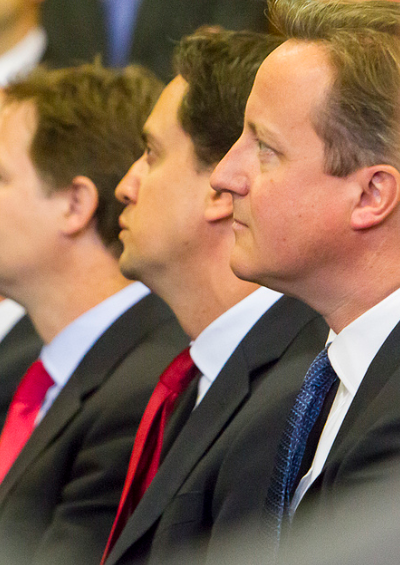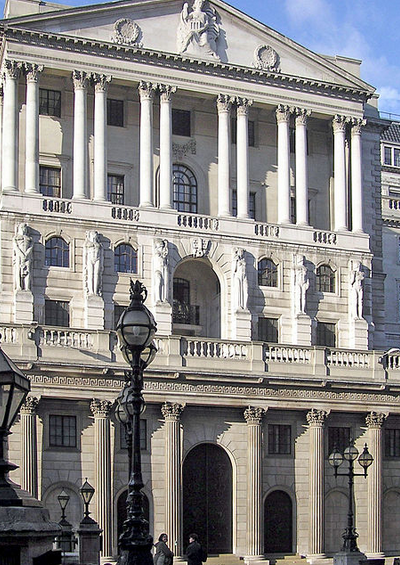10 Things They Won’t Tell You about the British Election
The upcoming election is the strangest in recent British political history.
May 7, 2015

1. Britain has finally become European. After a century of red or blue majority governments headed by either the Conservatives or Labour, Britain is becoming continental, more like the Netherlands, Denmark or, perish the thought, Greece! –- with multi-party elections, coalitions and no single party able to win a majority.
British electors no longer trust any single party to govern well or fairly and neither Prime Minister David Cameron nor his challenger, Labour leader Ed Miliband,has inspired or impressed.
2. Opinion polls are close to useless in the new electoral landscape. They survey 1,000-1,300 people to announce that the two main parties are stuck around 32, 33 or 34%. But each of the UK’s 650 constituencies is now its own election battlefield and a nationwide opinion poll talking to two people per constituency tells very little.
3. The Ross Perot effect. For the Conservatives, Ross Perot is the populist anti-European UKIP (United Kingdom Independence Party) which is sucking away Tory votes in England. Polling at between 10 and 15% of voting intentions means some small-majority Tory seats can be lost.
In Scotland, a tartan Ross Perot effect can be seen by the SNP (Scottish Nationalist Party) now expected to win a good number, if not all, Labour seats in Scotland, which will destroy Labour’s hopes of forming a government without help from other parties. But Scotland is now Britain’s Quebec.
4. Quebec. The Scottish parliament and devolved government set up by Tony Blair has turned into a full-flung independence movement. Not enough (as in Quebec) to win a referendum but enough to support separatist politics strong enough to tilt the balance of power in the House of Commons.
The Scottish nationalist leader, Nicola Sturgeon, is incisive, good on TV and sounds radical. She may hold the balance of power after election day on May 7th, even if no other party leader wants to be in bed with her.
5. Only domestic politics matter. Despite huge global problems – Putin in Ukraine, IS in Middle East, the disaster of the intervention by David Cameron and Nicolas Sarkozy in Libya, there is no place for foreign or defense policy issues in the campaign. Labour leader Ed Miliband tried to attack David Cameron over Libya, but came close to blaming Cameron for the tragic Mediterranean migrant drownings.
Britain is giving up on being a geo-political player. The proposed size of the British Army – a tiny 50,000 soldiers – is half the number of prisoners in UK prisons. Neither party will commit to meeting the 2% of GDP on defense set by NATO as the minimum target.
6. The end of ideas. This is an election without ideology. No-one mentions capitalism or socialism. The press is full of what kind of wives and home life the party leaders have. Ed Miliband offers to freeze electricity bills or link rent hikes to inflation.
David Cameron promises to hold down railway ticket prices. The nation yawns. This is a big-idea-free contest as the broad offers on managing Britain of the two potential Prime Ministers are more or less the same.
7. Where’s Social Media? Party loyalists tweet blah-blah and post pictures of candidates talking to a few people. No-one comes to meetings unless bussed in. Both camps produce ersatz pictures of teenage girls rah-rahing for Ed or Dave. But no-one is fooled. The argument that Social Media would dominate politics and make a difference to how people vote is not holding up in the British election maybe because of politics without personalities.
8. Politics without personalities. There are no stars who turn voters’ heads. The entire British political class – right, left, center – seems to have been to Oxford or Cambridge, done only politics for a living and sounds like salesmen for a product they don’t believe in passionately.
Tony Blair briefly flared with a powerful speech on Europe. For a few hours, there was a sense that a master politician was back, but the impact was quickly dissipated as fustian party leaders made new announcements that took over the day’s election news agenda.
9. Words no longer matter. This is an election without words, rhetoric or even half-decent sound bites. Labor leader Ed Miliband reprised Ronald Reagan when he turned to Prime Minister David Cameron and said, “There you go again” in the one TV debate where they met face to face. But the debate was farcical, as it involved seven party leaders – Tory, Labor, Liberal Democrats, UKIP as well as Scottish and Welsh nationalist parties.
Each leader had just two minutes to make a pitch and could not directly challenge each other as they answered questions from the moderator and the audience. No one learned anything from this stunted parody of an election debate. Since then, party leaders have answered questions separately and avoided direct debates with each other.
10. The unspoken issue. There is one monumental choice which will be determined by whether David Cameron stays in Downing Street or is replaced by Ed Miliband. If the former, Mr. Cameron has pledged to hold an In-Out referendum to allow Britain to quit the European Union at the polls in 2017.
Mr. Miliband has rejected this Brexit plebiscite, arguing that to spend two years of negotiating new terms for British membership of the EU will create global, not just European and British, uncertainty for investors and strategic partners like the United States.
So if Brits vote Cameron back into power, a Brexit referendum is held with the high risk of a vote to quit the EU. Vote Miliband and the UK stays in Europe, no question. This is by far the biggest issue that divides the Conservatives and UKIP from their liberal-left and nationalist opponents.
Yet the press and TV have had no discussion of the merits or demerits of Britain and Europe being dominated by a Brexit referendum debate between now and 2017, when Mr. Cameron proposes to hold his plebiscite.
Thus the one big difference between Cameron and Miliband has yet to become a major issue. The election is the strangest in recent British political history. With only a few days to go, it is refusing to come to life.
And whoever enters 10 Downing Street will face a surly unsettled Commons without a majority so the chances of a fresh election well before the end of the five year parliamentary term remain high.
Takeaways
What they won’t tell you about the UK election: Politically Britain has finally become European.
What they won't tell you about the UK election: Opinion polls are close to useless. Scotland is Britain’s Quebec.
The British political class sounds like salesmen for a product they don’t believe in.
The UK election is an election without ideas.

